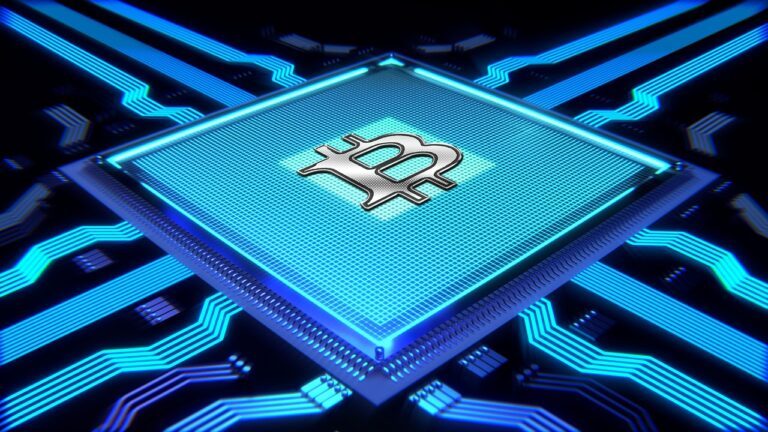On Sunday (February 20), Intel unveiled its second generation Bitcoin mining ASIC, which is called Bonanza mine (BMZ2).
On February 16, Intel Corporation CEO Patrick Gelsinger explained how his company’s upcoming crypto mining chip could help to solve Bitcoin’s “climate issue”.
According to his LinkedIn profile, Gelsinger started his career in October 1979 by becoming senior vice president and the general manager of the Digital Enterprise Group, and he kept these positions for the next 30 years. Also for five years, starting in January 2000, he was the company’s CTO. Before returning to Intel in February 2021, he was president and COO of EMC (Sep 2009 – Aug 2012) and CEO of VMware (Sep 2012 – Feb 2021).
His most recent comments about Bitcoin were made during an interview with Emily Chang on “Bloomberg Studio 1.0”.
Chang started by reminding Gelsinger that back in 2019 he had said “Bitcoin was bad design, extreme, and climate-intolerant”, and asked if he stell felt the same way.
Gelsinger replied:
“Indeed I do. A single ledger entry in Bitcoin consumes enough energy to power your house for almost a day. That’s a climate crisis, right, at that point, and the more you use it.
“If we produce a technology that consumes that much energy, wow, that’s not okay. And then… most of the uses when I said that were illicit, right? And it couldn’t be regulated. So, it could become a currency for nations and for people to use broadly as well.
“I have this mantra, you know, and we at Intel believe deeply that we have to be shaping technology as a force for good, right? If it’s being used for bad purposes, a climate crisis… Well, that is not good yet. That doesn’t mean it’s not a good technology, but we’re not using it good yet.
“Well, Intel is about to bring forward a blockchain chip, you know, that’s dramatically better, that is… orders of magnitude better in terms of power performance. So, we’re helping to solve the climate issue in that way. We want to work with the industry to find ways that technologies like blockchain can be properly regulated, managed as well so that they truly can be fully realized.
“So, yes, this is one of those areas that we’re gonna work on fixing this one because this is a powerful technology. An immutable leverageable digitized entry system can transform currency transactions, supply chain. So yeah, this one’s exciting.“
With regard to the blockchain chip Gelsinger referred to in the interview, on February 11, Raja M. Koduri, Senior Vice President and General Manager of the Accelerated Computing Systems and Graphics (AXG) Group at Intel, made the following announcement:
“Today, we at Intel are declaring our intent to contribute to the development of blockchain technologies, with a roadmap of energy-efficient accelerators. Intel will engage and promote an open and secure blockchain ecosystem and will help advance this technology in a responsible and sustainable way.
“We are mindful that some blockchains require an enormous amount of computing power, which unfortunately translates to an immense amount of energy. Our customers are asking for scalable and sustainable solutions, which is why we are focusing our efforts on realizing the full potential of blockchain by developing the most energy-efficient computing technologies at scale.
“Our blockchain accelerator will ship later this year. We are engaged directly with customers that share our sustainability goals. Argo Blockchain, BLOCK (formerly known as Square) and GRIID Infrastructure are among our first customers for this upcoming product. This architecture is implemented on a tiny piece of silicon so that it has minimal impact to the supply of current products.
“Intel Labs has dedicated decades of research into reliable cryptography, hashing techniques and ultra-low voltage circuits. We expect that our circuit innovations will deliver a blockchain accelerator that has over 1000x better performance per watt than mainstream GPUs for SHA-256 based mining. You will be able to learn more about our circuit innovations at the International Solid State Circuit Conference (ISSCC) this month.“
He went on to say:
“To support this, and additional emerging technology, we have formed the new Custom Compute Group within Intel’s Accelerated Computing Systems and Graphics business unit. The objective of this team is to build custom silicon platforms optimized for customers’ workloads, including blockchain and other custom accelerated supercomputing opportunities at the edge. Onward, we aspire to leverage technologies from our zetta-scale computing initiative to deliver energy-efficient solutions that make our tomorrow better than our today.“
According to a report by Cointelegraph, yesterday (February 20), at the virtual International Solid-State Circuits Conference (ISSCC), Intel unveiled its second generation Bitcoin mining ASIC, which is called Bonanza mine (BMZ2).
The report mentioned that BMZ2 is “an ultra-low-voltage energy-efficient Bitcoin mining ASIC that can deliver 40 Terahashes per second (40 TH/s) performance.” It went on to say:
“The BMZ2 chips are expected to follow an architecture similar to its 1st-gen mining chip BMZ1, wherein over 300 chips, powered by a 3600W miner, work together to deliver up to 40TH/s in a balanced environment.
“Intel’s next-generation BTC miner will be able to deliver a balanced performance of 40.4 TH/s by drawing 2,293W of power — recording a low energy consumption of 56.97 joules per terahash (J/Th). When compared to Bitmain’s hardware, Antminer S19j ASIC Bitcoin miner consumes 3,100 Watts for delivering up to 90 TH/s at room temperature, resulting in an efficiency of 34.5 J/Th.
“In addition, the hardware will also have the option to operate in high-performance and power-saving modes to optimize the energy-cost ratio across various degrees of mining efficiencies.“
Disclaimer
The views and opinions expressed by the author, or any people mentioned in this article, are for informational purposes only, and they do not constitute financial, investment, or other advice. Investing in or trading cryptoassets comes with a risk of financial loss.
Image Credit
Featured Image by “TheDigitalArtist” via Pixabay









